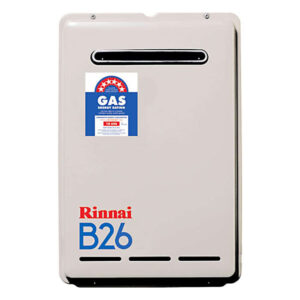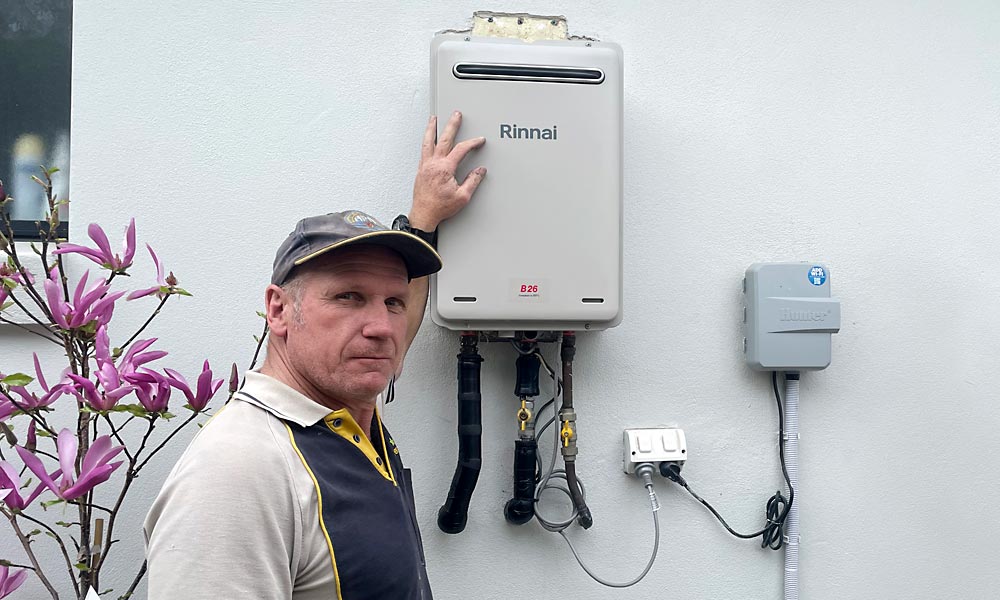
Rinnai 26 Continuous Flow Hot Water System Reviewed
Based on your FAQs and our more than 30 years of experience in the Canberra region, installing and repairing all types of hot water systems, we can confidently say that the Rinnai 26 should be on your list of the top 5 hot water systems if you are considering a hot water replacement or a new hot water installation in Canberra and surrounding regions.
The Rinnai 26 models, including the Rinnai 26B and the Rinnai Infinity, are suited to Canberra’s cooler climates and suburban hot water installations. They are unaffected by frost or weather conditions and can quickly provide large quantities of hot water.
We rated the installation of this hot water system based on its excellent value for money, longevity, serviceability, spare parts, aftersales service, efficiency, long-term environmental impacts, running cost and the ACT Government’s zero emissions.
Price based on longevity 4 out of 5

Longevity is expected to be 10-15 years, with servicing required once every five years. This is less than most other systems but longer than heat pumps and evacuated tube solar hot water systems.
Efficiency 3.5 out of 5

With a 5.9 star energy rating, these are very efficient gas hot water systems. Gas efficiency is approximately 5% better than a gas storage hot water system. Unlike heat pump hot water systems and solar hot water systems, their efficiency and recovery rate are not affected by the weather, their location or the time of hot water demand.
Reliability 4.5 out of 5

Rinnai makes a highly reliable continuous-flow hot water system. User error is the main contributor to faults in these systems. Most of the time, these faults can be overcome with a simple reboot. While there is no concrete evidence, we believe there is a correlation between the increase in rooftop solar and a detrimental effect on the circuit boards in these systems. They also do not produce hot water during blackouts.
Serviceability, spare parts and after-sales service 3.5 out of 5

These units are not very serviceable. They are more computer than plumbing. It is difficult for plumber gasfitters to keep up with the constant technical advances. Apart from the reboots, we find that they work until they don’t, and then we replace them. Given they are usually so reliable, giving them a low score for this is hard.
Benefits to the environment 1.5 out of 5

Currently, there are no hydrogen combustion hot water systems in Australia. While there is less embedded energy in these systems than heat pumps and solar hot water systems, the natural gas these systems combust is a fossil fuel and bad for the environment. Therefore, we could only give them a score of 1 star out of 5. However, these systems’ scores will increase when the gas networks transition to renewable gas. In the long term, we believe the score will increase to 5 stars out of 5 for these systems.
Value for money 5 out of 5

When compared to heat pumps and solar hot water systems, the Rinnai 26B and Rinnai Infinity hot water systems represent great value for money, given the amount of hot water they can produce in a short period.
Running costs excluding repairs and maintenance 1.5 – 2.5 out of 5 (average two stars )
Just in front of electric storage, not connected to solar PV and gas storage, but behind heat pumps and solar hot water systems.
Compatibility with ACT Government zero-emissions policy. 2.5 out of 5

For the government’s electrification policy to succeed, it is necessary to transition away from natural gas gradually and orderly. The Australian Capital Territory (ACT) electricity network needs more storage and distribution capacity for a rapid electrification switch. The rollout of renewable energy generation and storage must be synchronized with the phasing out of natural gas; otherwise, the cost of renewable electricity for Canberrans will inevitably skyrocket. There is an urgent need for careful planning and execution to ensure a smooth transition towards electrification.
There is evidence that careful planning and execution are urgently needed to ensure a smooth transition towards electrification as per the ACT Government’s policy.
These environmental impacts will include battery waste, land clearing for mining and processing metals, and using precious water resources in arid locations to build new transmission lines and BESS. Given the existing gas networks can store the same amount of green energy as 1.8 billion Tesla Powerwall batteries, the transition to green gas in our networks will have fewer detrimental impacts on our environment than full electrification.
Total Score: 26.5 out of 40


The Downsides
The government’s policy to phase out natural gas while hindering the transition to renewable hydrogen in our gas networks will result in high gas prices. Currently, renewable gas is unavailable, so the Rinnai’s use of fossil fuels is detrimental to the environment. They require gas and electricity and will not produce hot water during blackouts. It takes longer to get hot water from continuous-flow hot water systems than from any other type.
Suppose we have been able to make choosing a hot water system easier. In that case, we can provide a competitive quote for a Rinnai 26B, Rinnai infinity hot water system, or other types. Contact us now at 0448844911
Thank you for reading Why Rinnai 26 makes the top 5 hot water system reviews for Canberra’s climate. Compared to solar hot water, heat pump hot water, electric storage & gas hot storage heaters page
FAQ Answered
Is gas hot water better than solar?
Yes and no. Gas hot water is much better than solar hot water systems if you live in a large multi-story apartment building, as there is not enough roof space for the solar hot water collectors.
For smaller buildings with fewer occupants and plenty of unshaded roof space, an excellent solar hot water system like the Rheem Premier Hiline roof-mounted system is better than a gas hot water system. Gas hot water systems are less expensive and easier to install and repair than solar systems. However, storage systems are more dependable than solar and heat pump hot water systems.
Is gas being phased out in Australia?
Australia will completely phase out fossil fuel gas by 2050. The gas network owners are actively working towards creating a 100% renewable hydrogen network. This transition will occur through gradually blending green hydrogen into the existing gas networks over the next few decades.
Users of gas appliances will eventually need to change or alter their existing combustion appliances. Manufacturers of gas appliances are currently developing combustion appliances that work safely and efficiently with different blends of hydrogen and natural gas.
Therefore, appliance owners will likely require a single, one-time upgrade to make the transition. We may also see the introduction of solid oxide fuel cells (SOFC) that can produce electricity and heat attached to the sides of our homes and businesses.
Renewable hydrogen will become significantly more cost-effective than electricity within the next few decades. The existing gas networks can store the same amount of green energy as 1.8 billion Tesla Powerwall batteries. The transition to 100% green gas in our networks will have fewer detrimental impacts on our environment than full electrification and electric batteries.
Is gas hot water worth it?
Gas hot water heating is among the most reliable sources of hot water. The purchase price of gas hot water systems is low compared to most others, and gas hot water installations are fair value for money.
Gas hot water systems can produce more hot water quickly than any other type of hot water heating system. Gas water heaters take up very little room compared to other hot water systems. Electric, solar, and heat pump hot water systems cannot do the work that gas hot water systems can, and they are only suitable for some apartment buildings. Currently, gas hot water systems use fossil fuels that produce greenhouse gases.
The government will phase out fossil fuels (natural gas) over the next two decades, which will likely increase the price of natural gas. Transitioning to electric hot water heating can be costly and may not be worth the money. We will shift to renewable hydrogen in our gas networks within the next two decades. In most cases, gas hot water is worth it.
